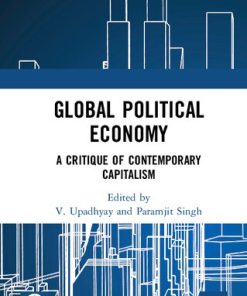Political Economy of Europe History Ideologies and Contemporary Challenges 1st Edition by Hardy Hanappi ISBN 0367641887 978-0367641887
$50.00 Original price was: $50.00.$25.00Current price is: $25.00.
Political Economy of Europe History Ideologies and Contemporary Challenges 1st Edition by Hardy Hanappi – Ebook PDF Instant Download/Delivery: 0367641887 978-0367641887
Full download Political Economy of Europe History Ideologies and Contemporary Challenges 1st edition after payment

Product details:
ISBN 10: 0367641887
ISBN 13: 978-0367641887
Author: Hardy Hanappi
The development of European unification has reached a critical stage. Despite 75 years of peace, increases in welfare, and growth since World War 2, there is now a growing scepticism of the European agenda from various quarters, most notably embodied in the exit of the United Kingdom from the European Union. To fully understand the dynamics at work, this book presents an introduction to the development of the political economy of Europe from 1900 to 2020.
The first part of the book provides an overview of European economic and political history from 1900 to the present. It is clear from this history that Europe’s population, and most notably its leaders, have been deeply influenced by ideology during this time. This sets the context for the second part of the book, which takes a closer look at some major paradigms framing European dynamics: (1) the market-oriented paradigm, (2) Marx’s paradigm, and (3) the fascist paradigm. In this part, the essential core of each of these paradigms is presented and critiqued. In the third part, the current bottlenecks of European evolution (the migration crisis, Brexit, rise of new Fascism, the climate crisis, the COVID-19 pandemic) are investigated in the light of a possible emergence of a new scientific paradigm. Europe’s role in the global division of labour – its possibility to serve as a role model for the advantages of democratically governing a highly diverse set of populations – is also explained.
This book is an ideal text for students undertaking courses on the political economy of Europe in either economics or politics departments.
Political Economy of Europe History Ideologies and Contemporary Challenges 1st Table of contents:
-
Preface
- Introduction to the Political Economy of Europe
- The Evolution of Europe’s Economic Systems
- Acknowledgements
-
Chapter 1: Introduction to Political Economy in Europe
- Defining Political Economy
- The Intersection of Politics and Economics in European History
- Key Concepts: Capitalism, Socialism, and Social Democracy
-
Chapter 2: The Historical Roots of European Political Economy
- The Legacy of Feudalism and Early Capitalism
- The Enlightenment and Economic Thought
- The Industrial Revolution and the Rise of Modern Capitalism
- The Birth of the Nation-State and Economic Sovereignty
-
Chapter 3: Ideologies of Political Economy
- Classical Liberalism and Economic Free Markets
- Marxism and the Critique of Capitalism
- Social Democracy and the Welfare State
- Neoliberalism and Market Fundamentalism
-
Chapter 4: The Development of European Economic Integration
- From the Treaty of Rome to the European Union
- The Common Market and the Eurozone
- The Political and Economic Implications of European Integration
- The Role of the European Central Bank and Economic Policy Coordination
-
Chapter 5: Europe’s Social Market Economy
- The Concept of the Social Market Economy
- Balancing Free Markets and Social Welfare
- The German Model: Successes and Challenges
- The Scandinavian Welfare State: A Comparative Analysis
-
Chapter 6: Europe’s Economic Crisis and Its Aftermath
- The 2008 Financial Crisis: Causes and Consequences
- The Eurozone Debt Crisis and Austerity Measures
- The Political Economy of Bailouts and Economic Reforms
- Social Unrest and Political Challenges Post-Crisis
-
Chapter 7: The Politics of Economic Policy in Europe
- The Role of Political Parties and Economic Policy
- The Power of Interest Groups and Corporate Influence
- The Impact of European Institutions: The EU, the European Parliament, and the European Commission
- Economic Policy in National Governments vs. Supranational Entities
-
Chapter 8: Labour Markets and Inequality in Europe
- Employment Trends and Labour Market Flexibility
- The Impact of Globalization on European Jobs
- Income Inequality and Wealth Distribution
- The Politics of Labour Rights and Trade Unions
-
Chapter 9: The Rise of Populism and Its Economic Implications
- The Economic Roots of Populist Movements in Europe
- Immigration, Globalization, and Economic Anxiety
- The Politics of Economic Nationalism
- The Impact of Populism on European Economic Integration
-
Chapter 10: Environmental Sustainability and the Green Economy
- The European Union’s Role in Environmental Policy
- Green Capitalism and the Transition to a Sustainable Economy
- The Economics of Climate Change: Challenges and Opportunities
- The Role of Renewable Energy and Green Jobs in Europe’s Future
-
Chapter 11: Europe’s Global Economic Standing
- Europe’s Role in the Global Economy: A Comparative Analysis
- The Rise of China and its Impact on European Economies
- Trade Relations: The EU and its External Partners
- Europe and Global Governance: The Future of Multilateralism
-
Chapter 12: Contemporary Challenges and the Future of Europe’s Political Economy
- The Future of the Eurozone: Integration vs. Disintegration
- Economic Recovery Post-COVID-19: Opportunities and Obstacles
- Technological Disruption and the Future of Work in Europe
- The Role of Europe in a Changing Global Order
-
Conclusion: Reimagining the Political Economy of Europe
- Toward a More Inclusive and Sustainable Future
- The Role of Democracy and Economic Justice in European Politics
- Final Thoughts on the Political Economy of Europe
-
References
-
Index
People also search for Political Economy of Europe History Ideologies and Contemporary Challenges 1st
political context of europe in
political history of europe
political social and economic factors of the european world view
political ideologies in europe
political development of europe
Tags:
Hardy Hanappi,Political Economy,Europe History
You may also like…
Uncategorized
Politics & Philosophy - Government & Politics
Uncategorized
Politics & Philosophy - Social Sciences
Political Ideologies: An Introduction 7th Edition Andrew Heywood
Politics & Philosophy - International Relations
Uncategorized
Political Ideologies An Introduction 7th Edition by Andrew Heywood 1352011832 9781352011838
Politics & Philosophy - Social Sciences
Business & Economics
Off the Target: The Stagnating Political Economy of Europe and Post-Pandemic Recovery Nasir











